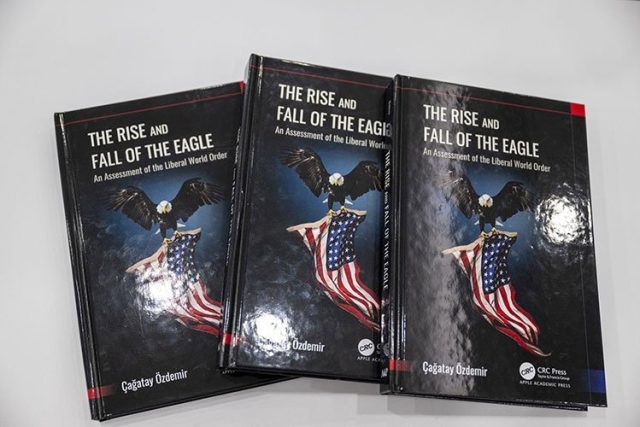“The U.S. hegemony is viewed as an invincible axis but the world order we see now reflects an opposite reality,” associate professor Çağatay Özdemir said.
Özdemir, deputy head of the Turkish Presidency’s Directorate of Communications, is the author of a book shedding light on the evolution of this hegemony. “The Rise and Fall of the Eagle: An Assessment of the Liberal World Order” gives insight into the establishment of an international liberal order centered on principles of the U.S. hegemony and its rise, along with practices that shook the international liberal order and questions whether the order accomplished its goals.
The book, which has been published by Apple Academic Press in collaboration with Routledge/Taylor and Francis Group, the world’s leading international publishing house, analyzes how and why the liberal world order that emerged as a result of the end of the Cold War and the dissolution of the Soviet Union was established. It offers a historical perspective on the topic, including the free trade system, cooperative security, collective decision-making and democratic unity since the post-World War II period. Additionally, it examines the challenges faced by the international system.
Özdemir spoke to Anadolu Agency (AA) on his new book and delved into a debate about the future of this order. ”The liberal world order was constructed following the Cold War. An axis that is the focal point of the debate on an international system, which is in fact centered on Fukuyama’s ‘End of History’ thesis and is regarded as indestructible,” he said. According to Özdemir, transformations across the world after the Cold War proved that the system based on American hegemony was not very sustainable and not even fully entrenched in the international system.
“Both regional and global developments indicate that various perspectives are emerging in the world order. The book focuses on these fundamental paradoxical aspects,” he said.
Regional and global crises that the American hegemony faces, crises that challenge the liberal world order and their main causes are examined in-depth in the book. Özdemir says the liberal world order, providing a roof for the seemingly invincible and unalterable axis that is American hegemony, is running counter to reality on the ground.
“The ascent of the radical right in Europe, the challenges to the liberal world order posed by Trump-era foreign policy, global supranational structures such as the U.N., NATO and the EU losing their ground, the rise of Russia and China as dominant global players, and the overall transformation of the international system due to these factors highlight the necessity for a reconstructed international framework. I have aimed to address fundamental elements in this book,” Özdemir said.
This need for reconstruction is reflected in President Recep Tayyip Erdoğan’s mantra: “World is bigger than five,” which refers to a number of members of the U.N. Security Council. Özdemir’s book also delves into this statement and highlights the necessity for a new axis in the international system and necessary reforms in the U.N.
As it looks beyond conventional paradigms of international relations centered on the Western view, the book questions the validity and legitimacy of American hegemony and the liberal world order. It emphasized the fact that a new reality where the relative influence and power of the U.S. are gradually diminishing as the world is now becoming a post-American world.
Türkiye’s key role
The order is challenged by evolving global and regional powers and new actors of a new order. One of them is Türkiye. Özdemir stresses that the country’s significance rose due to its proactive foreign policy. He says Türkiye is an arbitrator, protector and mediator in regional and international conflicts.
“In this regard, we endeavor to underscore in the book that the axis established by Türkiye’s multifaceted visionary diplomacy should be interpreted in conjunction with the transformation of the international global system. Because the international liberal order is not solely about American hegemony. Therefore, in the context of Türkiye’s pursuit of becoming a global actor, its efforts to address regional conflicts and eliminate the humanitarian crisis in Gaza, its role as a mediator in the Ukraine-Russia War, its involvement in resolving tensions in the Balkans, and particularly its presence in the Armenia-Azerbaijan War hold considerable significance.”





